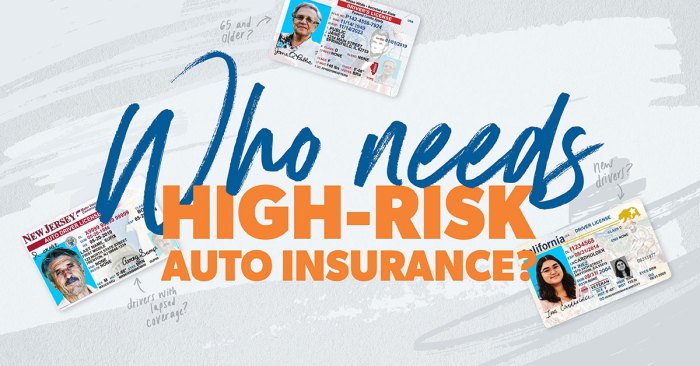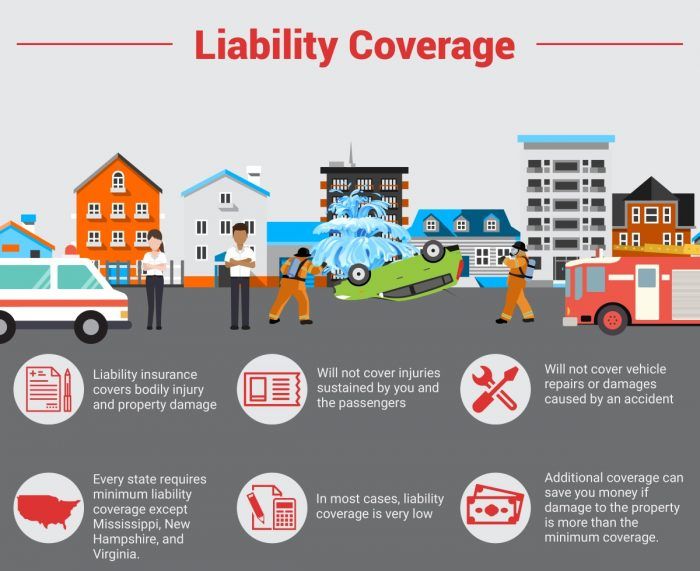High-Risk Auto Insurance: Options for Challenging Profiles
Embark on a journey through the realm of High-Risk Auto Insurance: Options for Challenging Profiles, where the complexities of insurance for challenging drivers are unraveled in an engaging and informative manner.
Delve into the intricacies of high-risk auto insurance and explore the myriad factors that shape coverage options for individuals with challenging profiles.
Overview of High-Risk Auto Insurance
High-risk auto insurance refers to a type of insurance coverage designed for individuals who are considered riskier to insure due to various factors. These individuals may have a history of accidents, traffic violations, poor credit scores, or other characteristics that make them more likely to file a claim.
Common Reasons for High-Risk Profiles
There are several common reasons why individuals may fall under high-risk profiles when it comes to auto insurance:
- Past Accidents: Individuals who have been involved in multiple accidents in the past are considered high-risk as they are more likely to be involved in future accidents.
- Traffic Violations: Those with a history of traffic violations such as speeding tickets, reckless driving, or DUIs are seen as higher risk drivers.
- Poor Credit History: Insurers may view individuals with poor credit scores as higher risk due to potential financial instability.
- Inexperienced Drivers: Young drivers or those with limited driving experience are often classified as high-risk due to their lack of time on the road.
Types of High-Risk Auto Insurance Coverage
When it comes to high-risk auto insurance, there are several types of coverage available to help protect drivers with challenging profiles. Understanding the different coverage options and choosing the right one based on individual needs is crucial for managing risks effectively.
Liability Coverage
Liability coverage is mandatory in most states and helps pay for damages and injuries you cause to others in an accident. For high-risk drivers, having sufficient liability coverage is essential to protect against potential lawsuits and financial losses.
Collision Coverage
Collision coverage helps pay for damages to your own vehicle in a collision with another vehicle or object. While collision coverage may increase premiums for high-risk drivers, it provides valuable protection for repairing or replacing your car after an accident.
Comprehensive Coverage
Comprehensive coverage protects your vehicle from non-collision related incidents such as theft, vandalism, or natural disasters. High-risk drivers may benefit from comprehensive coverage to safeguard their vehicle against a wide range of risks beyond accidents.
Uninsured/Underinsured Motorist Coverage
Uninsured/underinsured motorist coverage steps in when you're involved in an accident with a driver who doesn't have insurance or enough coverage to pay for damages. This type of coverage is particularly important for high-risk drivers who may encounter uninsured motorists on the road.
Personal Injury Protection (PIP)
Personal Injury Protection (PIP) coverage helps cover medical expenses for you and your passengers regardless of who is at fault in an accident. For high-risk drivers, PIP can provide crucial financial support for medical bills and lost wages in the event of an injury.
Rental Reimbursement Coverage
Rental reimbursement coverage pays for a rental car if your vehicle is being repaired due to a covered claim. High-risk drivers may find this coverage helpful in maintaining transportation while their car is out of commission.
Roadside Assistance
Roadside assistance coverage offers services like towing, fuel delivery, and tire changes in case of a breakdown. For high-risk drivers who may experience more vehicle issues, roadside assistance can provide peace of mind and quick assistance in emergencies.
Insurance Companies Offering High-Risk Auto Insurance

When it comes to high-risk auto insurance, there are specific insurance companies that specialize in providing coverage for drivers with challenging profiles. These companies have the expertise and resources to assess risk factors and offer suitable coverage options.
Reputable Insurance Companies
- GEICO
- Progressive
- The General
- Titan Insurance
These companies have a strong reputation for providing high-risk auto insurance and have tailored solutions for drivers with challenging profiles.
Criteria for Eligibility
- Driving Record: Insurance companies assess driving history, including accidents, traffic violations, and DUI convictions.
- Age and Experience: Young drivers or individuals with limited driving experience may be considered high-risk.
- Vehicle Type: High-performance cars or vehicles with a history of insurance claims may impact eligibility.
Insurance companies evaluate various factors to determine eligibility for high-risk auto insurance coverage, ensuring that premiums reflect the level of risk.
Premium Calculation
- Risk Assessment: Insurance companies use complex algorithms to assess risk factors and calculate premiums accordingly.
- Policy Coverage: The type and level of coverage selected by the policyholder also influence premium rates.
- Location: The area where the driver resides can impact premium calculations due to varying levels of risk associated with different regions.
Insurance premiums for high-risk profiles are calculated based on a combination of risk factors, coverage options, and individual circumstances, ensuring that drivers receive appropriate coverage.
Strategies to Lower High-Risk Auto Insurance Premiums
High-risk drivers often face higher insurance premiums due to their driving history or other factors. However, there are strategies they can employ to potentially lower their insurance costs.
Defensive Driving Courses
One effective way for high-risk drivers to reduce their insurance premiums is by taking defensive driving courses. These courses can help improve driving skills, increase awareness on the road, and demonstrate a commitment to safe driving practices.
Telematics Devices
Another option for high-risk drivers is to consider using telematics devices. These devices track driving behaviors such as speed, acceleration, and braking. By showcasing safe driving habits, drivers may be eligible for discounts on their premiums.
SR-22 Insurance and High-Risk Profiles
SR-22 insurance is a form of financial responsibility certification required for high-risk drivers who have been involved in serious traffic violations or accidents. This document is often mandated by state authorities to prove that the driver has the minimum required auto insurance coverage to operate a vehicle legally on the roads.
Obtaining an SR-22 Certificate
To obtain an SR-22 certificate, the driver must contact their insurance provider and request the filing of the SR-22 form with the state DMV. The insurance company will then submit the form on behalf of the driver. It's crucial to maintain continuous coverage while the SR-22 is in effect, as any lapses or cancellations can lead to severe penalties, including license suspension.
Implications of SR-22 Insurance
Having an SR-22 certificate can significantly impact insurance premiums for high-risk drivers. Insurance companies view drivers requiring an SR-22 as high-risk individuals, leading to higher premiums to offset the increased likelihood of claims. Additionally, the coverage options for drivers with an SR-22 may be limited, with higher deductibles and reduced policy limits compared to standard insurance policies.
Final Conclusion
As we reach the conclusion of our discussion, a comprehensive summary awaits, encapsulating the key insights and takeaways of navigating high-risk auto insurance for challenging profiles.
FAQ Explained
What are some common reasons for individuals falling under high-risk profiles?
Factors such as past accidents, traffic violations, and poor credit history can contribute to being classified as high-risk.
How can high-risk drivers lower their insurance premiums?
High-risk drivers can consider options like improving their driving habits, taking defensive driving courses, or using telematics devices to potentially reduce premiums.
What is SR-22 insurance and how does it impact high-risk profiles?
SR-22 insurance is a certificate required for certain high-risk drivers. It can affect premiums and coverage by demonstrating financial responsibility to the state.




